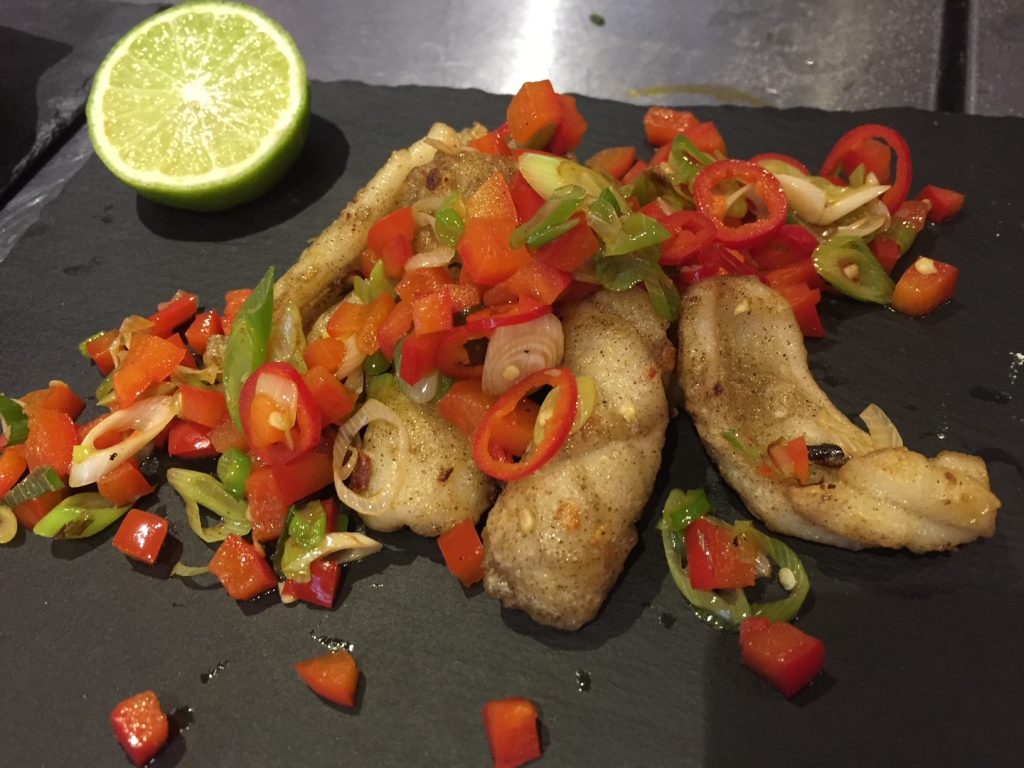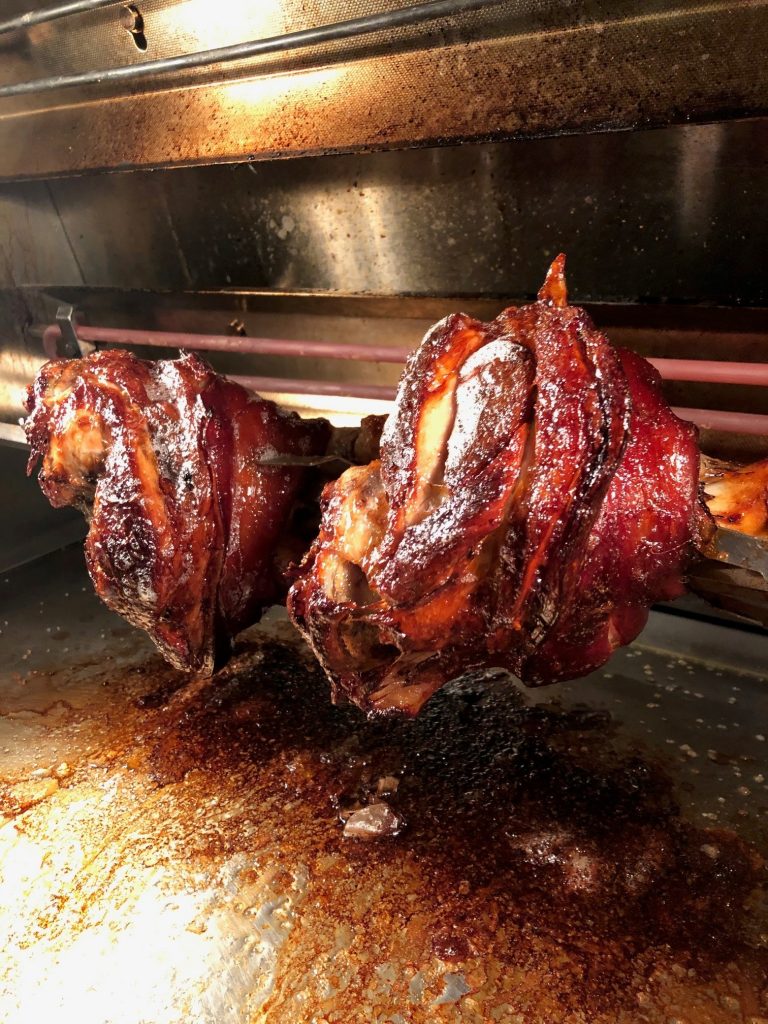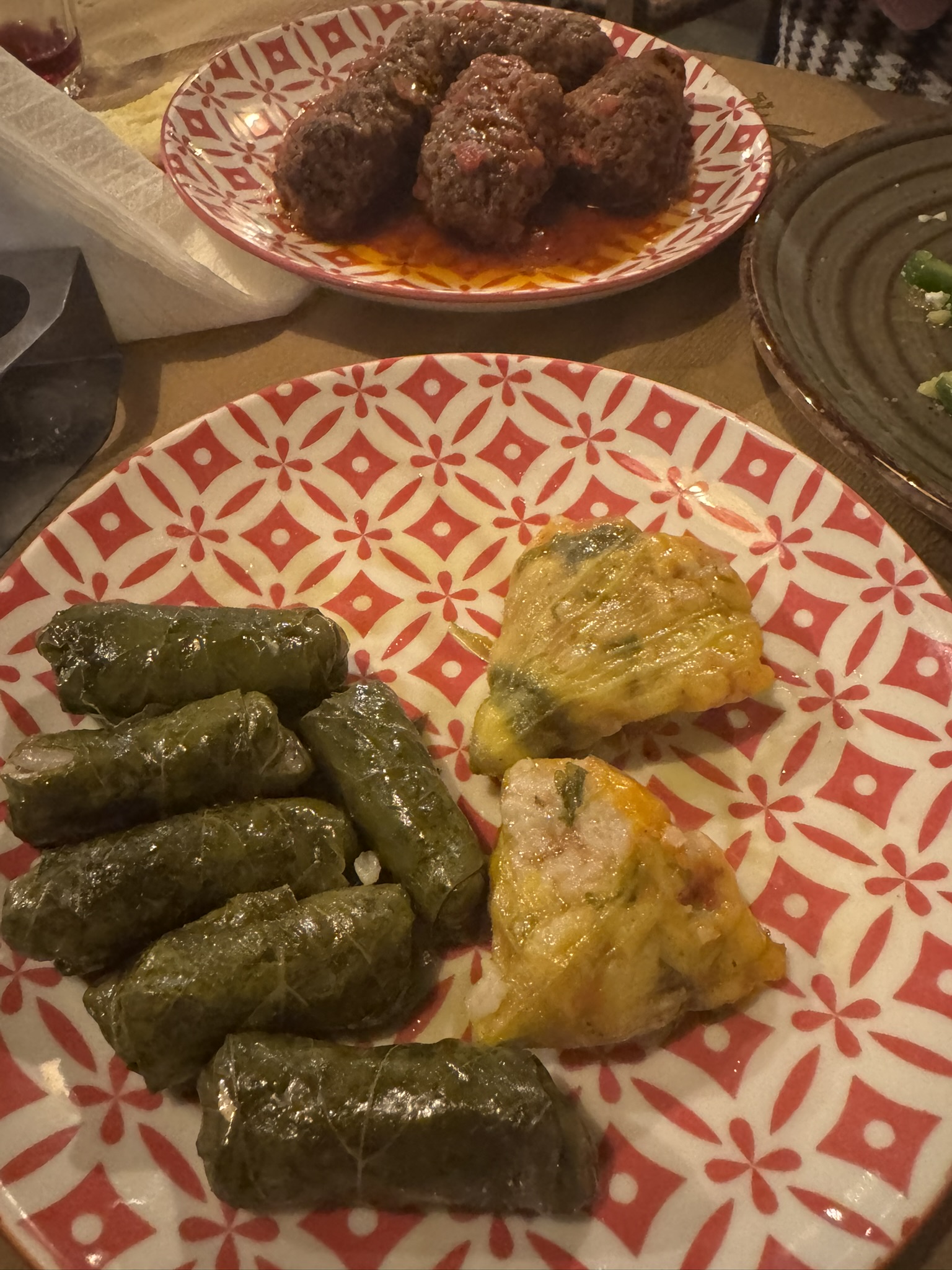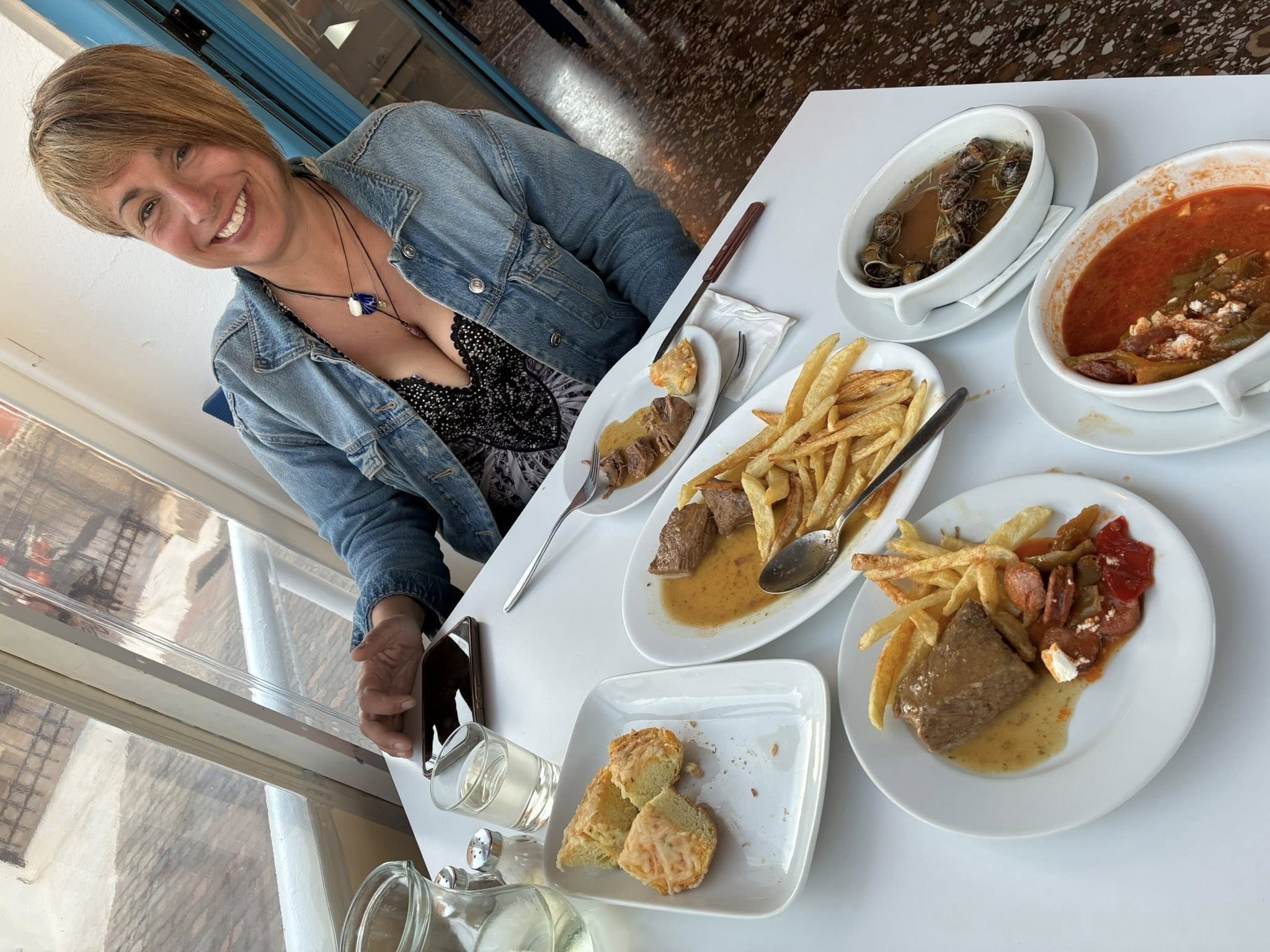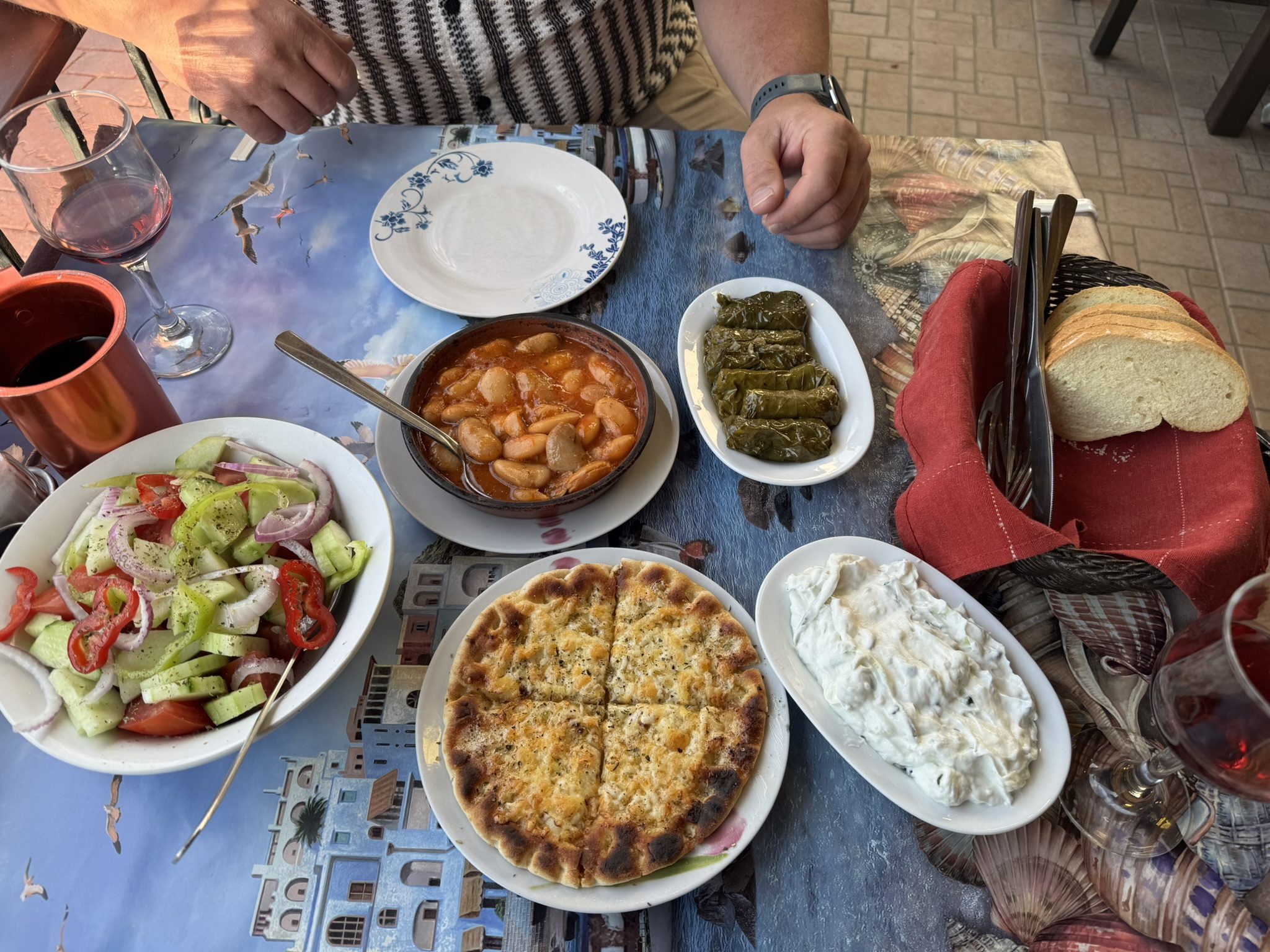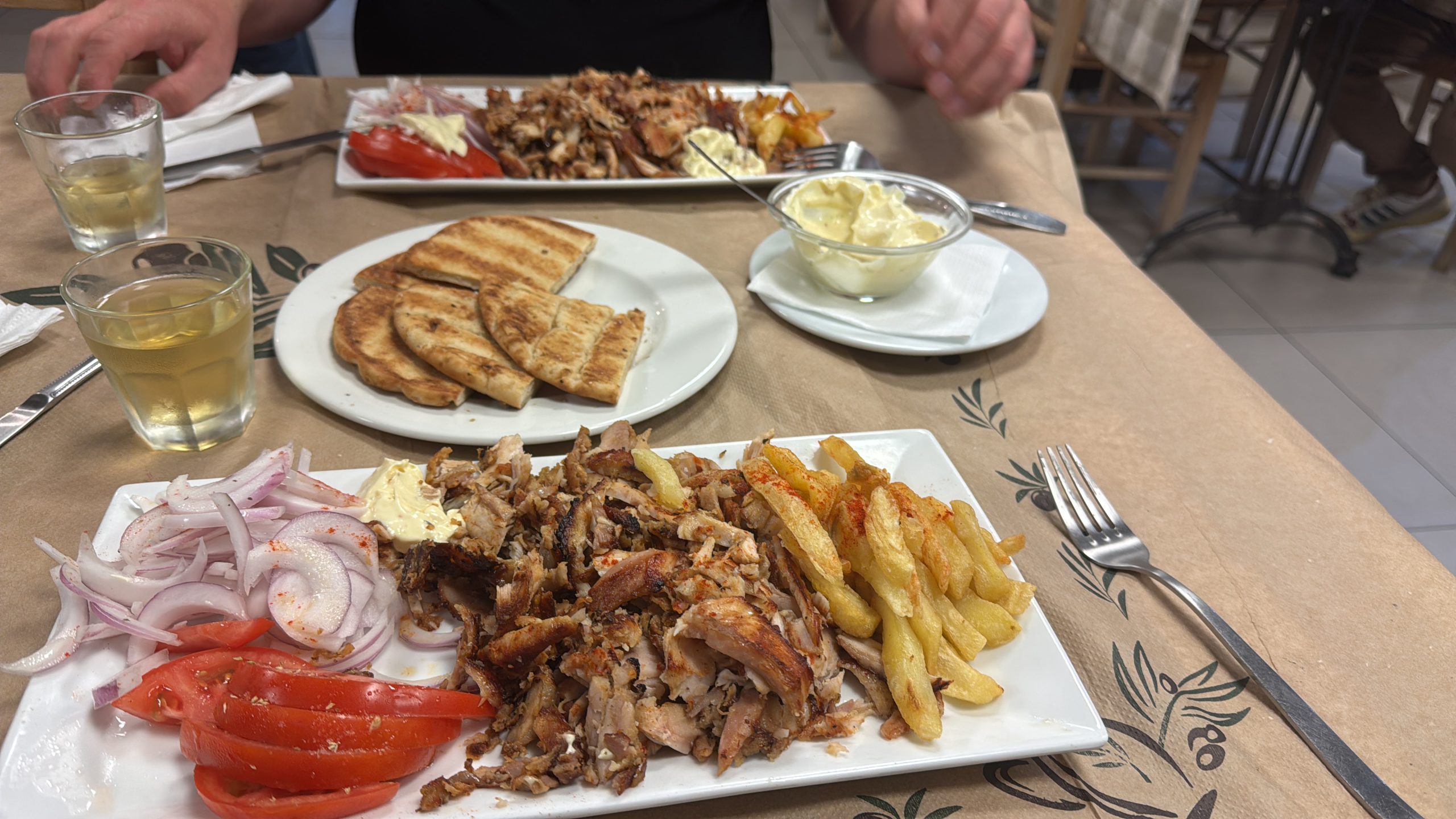Gravy stains and tall tales await you!
Embark on a real foodie journey with Julie Harris
Welcome to Gravy stains and tall tales: A real foodie journey, where every dish comes with a story, and every stain has a memory. This blog isn’t about perfectly plated food or spotless kitchens – it’s about the messes we make, the laughter that echoes around the dinner table, and the unforgettable meals that leave a mark long after the plates are cleared.
From pub grub to family recipes passed down through generations, we’ll explore the real, unpolished side of food – the mishaps, the triumphs, and the tall tales that make every bite worth savouring. Pull up a chair and dig in!
Explore
The blog…
Dive into delightful recipes that blend Canadian heritage with British flair! Julie’s creations promise to tantalize your taste buds and spark joy in your kitchen.

The book…
Lies, theft and shit on the ceiling: A Canadian’s journey to pub ownership in England
Coming soon!
Unleash the foodie within
Indulge in the authenticity of homemade meals and the warmth of shared tales.
Crete, day three: Sweat, sand, and stuffed zucchini flowers
Some days you wake up on a Greek island and decide to walk straight into madness. A 1.5-hour hike from the quiet charm of Piskopiano Crete Greece to Stalis Beach, Crete doesn’t sound crazy — until you’re halfway there, uphill,…
Crete, day two: Sun, snails, and the sacred order of Beef Limonata
Some days, travel is about climbing mountains, dodging scooters, chasing museums. Other days, it’s about surrender. Total, unapologetic surrender to the fine art of doing absolutely nothing. Today was the latter. The pool at Amazones Village Suites**** is more than…
Crete, day one point two: Wine, ants, and the gospel according to Nikos
If paradise had a lobby, it would probably look something like the Amazones Village Suites**** in Piskopiano Crete Greece. Not the fake, polished, soulless kind of resort paradise — but the real deal. Perched up a hill with sea air…
Crete or Bust: A tale of delays, diverts, and damn good tomatoes
4am. Handcross. Dark. Quiet. The kind of quiet that hums in your ears and makes your thoughts louder than they should be. But there’s something romantic about starting a journey before the world wakes up — like you’re stealing a…
DAY 15-17: SEX-CRAZED MONKEYS, HOT SPRING FACEPLANTS & THE DEATH OF POLITENESS (ft. Shanghai Layover Madness)
There’s something beautifully deranged about ending your Japanese pilgrimage face-down in monkey crap. But let’s rewind. Final leg of the trip: Yamanouchi, home of the snow monkeys. These are not the polite, Zen-inspired creatures you’ve seen in travel brochures. These…
Facebook Posts
Happy New Year, you beautiful degenerates.
May the coming year be soaked in good booze, bad decisions, questionable street food, late nights, earlier mornings than planned, and stories you’ll swear never happened—but absolutely did.
Eat the thing you’re told not to.
Order another round.
Talk to strangers.
Burn something slightly.
Laugh too loud.
Here’s to a year of flavour over fear, joy over judgement, and debauchery done with purpose.
See you at the bar. 🥂
… See MoreSee Less
STOP EATING YOUR OWN: A NOTE FROM THE BACK OF THE KITCHEN
There’s a moment in every failing kitchen when the knives stop being used on food and start getting tested on each other.
You see it in the eyes first. The sideways glances. The whispered bitching. The sudden urge for everyone to be head chef despite barely being able to run the pass. The enemy isn’t the burnt steak anymore—it’s the guy standing next to you holding the tongs.
That’s where the British Right is right now.
And it’s ugly.
Somewhere along the way, the conversation stopped being about ideas, outcomes, or the people who actually live with the consequences of policy. Instead, it turned into a circular firing squad—accusations of dictatorship, purity tests, ego-driven walkouts, and shiny new “movements” that look suspiciously like the old ones, just with different letterheads and louder voices.
Let’s be clear: calling your own side “dictators” doesn’t make you principled. It makes you reckless. And lazy. It hands ammunition to people who didn’t earn it and don’t deserve it.
This isn’t how you win anything.
I’ve worked in enough kitchens, watched enough revolutions—culinary and otherwise—to know how this ends if no one grows the hell up. You fracture. You splinter. You lose. And the people you claim to hate most inherit the keys while you’re still arguing over whose name goes on the menu.
The emergence of breakaway parties, independents rebranding themselves as saviours while carrying the same manifesto in a slightly different font, isn’t brave. It’s not bold. It’s not even new. It’s vanity masquerading as conviction.
And yes—these splinter groups are gaining ground. That should terrify you, not excite you.
Because public opinion is not loyalty. It’s weather. It changes fast, violently, and without apology. One bad headline, one stupid soundbite, one poorly timed ego-trip, and the wind shifts. Always has. Always will.
Reform—or whatever name you want to hang on the main mast—has a strong hold right now. That’s not a moral victory. That’s a moment in time. And moments get squandered when too many people insist on being the loudest voice in the room instead of the last one standing.
Here’s the part no one likes to hear: Labour is not being beaten by brilliance on the Right. Labour is being saved by stupidity on it.
While you’re busy fighting over leadership, tone, and who gets to sit at the head of the table, the opposition doesn’t have to do a damn thing. They just wait. They watch. They let you bleed out on the kitchen floor.
This isn’t about personalities. It’s not about who’s more “authentic” or who shouts the hardest into a microphone. It’s about outcomes. Power. Direction. Whether you actually want to govern—or just be right on Twitter.
Egos need to be checked. Public spats need to stop. The performative outrage needs to be dialled down before it consumes the entire operation. You don’t win by humiliating your allies. You don’t build trust by lighting matches in a room full of gas.
Unity doesn’t mean obedience. It means recognising the real enemy and refusing to do their work for them.
So here’s the blunt truth from the back of the kitchen, where the food is ugly but honest:
If the Right keeps tearing itself apart, Labour doesn’t need to defeat you. You’ll do it yourselves—efficiently, publicly, and with the kind of self-righteous confidence usually reserved for people who never see the bill until it arrives.
Put the knives down.
Face the right direction.
And decide—once and for all—whether you’re here to win, or just to be heard while everything burns.
Nigel Farage
Nigel Farage: Supporters' Group
Rupert Lowe Rupert Lowe, saying, what you are thinking!
Ben Habib (Advance U.K.) for PM U.K. Ben Habib & Advance UK Party Supporters Group.
… See MoreSee Less
What was the point? A Remembrance Day nobody wants to talk about.
Every year, we stand in the cold, poppies pinned to our coats, heads bowed in silence. We tell ourselves we are remembering. Remembering courage. Remembering sacrifice. Remembering a generation of men and women who walked towards gunfire so that we could live freely.
And yet — look around.
We have sleepwalked into a world where the freedoms they fought for are being bartered away like two-for-one toilet roll in the discount aisle. Digital IDs. Biometric passes. “Show me your QR code, citizen.” Systems being slipped quietly into place under the polite, reassuring language of “convenience,” “safety,” and “modernisation.”
As if a free society should ever need permission to exist.
Recently, a 100-year-old World War II veteran was interviewed. A man who landed on foreign soil under fire. A man who lost friends beside him. A man who did not know he would ever make it home.
He looked into the camera and said, “I sometimes wonder why I bothered.”
Not because he regretted his service.
But because he struggles to recognise the country he fought for.
A country where the government now talks openly about digital identity frameworks.
Where banks decide whether you may or may not access your own money.
Where dissent is labelled dangerous.
Where compliance is rewarded.
Where the foundations of a social credit system — the very thing we shook our heads at in China and said “that could never happen here” — are being welded into the architecture of everyday life.
All while we nod.
All while we scroll.
All while we do as we’re told.
Let me be clear: freedom does not disappear overnight.
It erodes.
One “temporary measure” at a time.
The people pushing digital ID will tell you:
• It’s just to make things easier.
• To prove who you are.
• To access services seamlessly.
• To keep you safe.
But when the same credential that proves who you are can also determine:
what you’re allowed to do,
who you’re allowed to see,
what you’re allowed to buy,
and whether you get to participate in society —
you no longer live in a free country.
You live in a permissioned one.
And permission can be revoked.
The men who fought in World War II were not polished saints from history textbooks. They were human. They argued, swore, bled, panicked, hoped, and fought anyway.
But what united them was a belief — not in perfection — but in freedom.
The right to speak.
The right to move.
The right to live without surveillance.
The right to stand up and say “No.”
So tell me — honestly — what would those men think of us now?
Of a public trained to fear disapproval.
Of a population that apologises before it speaks.
Of citizens so grateful to be managed that they forget how to demand better.
On Remembrance Day, the silence feels heavier now.
Not just for those who died —
but for the freedoms that are dying.
We have not been defeated by invaders.
We have been softened by mismanagement, sedated by convenience, and ruled by people who believe themselves entitled to control.
And yes — we should be ashamed.
Ashamed that a 100-year-old veteran looks at us and questions whether his sacrifice still means anything.
But shame can be useful — if it wakes us.
If it reminds us that freedom is not ceremonial.
Not symbolic.
Not something to honour once a year in silence and forget by lunchtime.
Freedom must be lived.
Or it dies.
This Remembrance Day, don’t just remember the past.
Defend the present.
Because the people who fought for our freedom —
should not live to see us surrender it.
… See MoreSee Less
Review: Tamasha’s Handcross (née The Royal Oak Inn)
There are restaurants that feed you. And then there are restaurants that slap you across the face, pour you a pint, and remind you why you left the house in the first place. Tamasha’s is the latter.
I should know—I used to own the place back when it was The Royal Oak Inn. A creaky, quintessential English pub where the beams were low and gravity did unspeakable things to a man’s pint if he forgot to duck. Now? It’s reborn as a Bangladeshi fever dream—richly decorated, humming with life, and yes, featuring a goddamn fish tank built into the floor. Forget your Instagrammable neon wings or “press for prosecco” buttons—these lunatics put a 20-year-old koi collection under your feet, plus a baby sturgeon named Spike who greets you like the maître d’ of Atlantis.
The food? Excellent. The kind of meal that makes you look at the sad jar of supermarket curry paste in your kitchen and wonder what the hell you’re doing with your life.
• The pappadom and pickle tray should come with a warning label: addictive.
• The onion bhaji? Best I’ve ever had, anywhere. Golden, crisp, whispering sweet nothings in your ear as you crunch your way to nirvana.
• The biryani—spiced with the kind of confidence most chefs only dream about—melts down to pure meat-butter on the tongue.
• And then there are the house specials, each one a bullet with your name on it.
But the crown jewel, the pièce de résistance, the thing that makes me want to pitch a tent under those cursed low beams and live there forever—the Tamasha naan. Fluffy, charred, stuffed with cheese and minced lamb, kissed by fire and the culinary gods. The kind of bread you cradle like a newborn and don’t share, not even with your mother. Pair it with a cold Kingfisher at the bar and some godawful daytime TV glowing up from the floor (yes, the floor), and you’ve achieved enlightenment.
My only gripe? They’ve ruined my favorite sport. The old Oak’s low beams used to claim pint after pint, forehead after forehead, providing endless entertainment as patrons knocked themselves senseless on their way to the loo. I lost count of the number of free beers I handed out, replacing dropped pints for dazed customers with fresh lumps on their skulls. Now the beams wear “Watch Your Head” signs. Where’s the fun in that?
Tamasha’s is not just a restaurant. It’s a resurrection. A place where Bangladeshi hospitality meets English pub bones, and the result is magic. If you don’t walk out grinning, full, and just a little bit in love with a sturgeon named Spike—you’re dead inside.
… See MoreSee Less
Brunol: The day I marinated in a Bloody Mary from hell
You haven’t lived until you’ve been simultaneously pickled, trampled, and slow-cooked in the Mediterranean sun with 15,000 strangers and several metric tons of overripe produce. Yesterday was my La Tomatina baptism in Brunol, and I now know what it feels like to be the garnish in a drunk Spaniard’s gazpacho.
The day began in a way all regrettable days do: far too early, with misplaced trust in Google. The plan was simple—catch a bus at 07:30 near the zoo. The universe, however, had other plans. Google, that smug, all-knowing digital bastard, lied. The bus wasn’t for another 30 minutes. So, six of us summoned an Uber instead, because nothing screams “traditional Spanish cultural immersion” like piling into a ride-share with a driver who’s already had enough of tourists for one lifetime.
We arrived in Brunol with minutes to spare, just in time to queue for what I assume was the Guinness World Record for “longest line in human history.” Mercifully, our ragtag crew included Justin—a Brit with a moral compass set to “meh.” Queue jumping commenced, much to the fury of one German woman whose glare suggested she had personally invented the concept of orderly lines and was deeply offended by our revolutionary ways.
Wristbands secured, lockers assigned, souvenir t-shirts donned—we entered the waiting zone. La Tomatina doesn’t start until noon, so there was only one logical thing to do at 9 a.m.: drink. Beer, wine, lemonade spritzers—because nothing pairs with impending chaos like a cheap hangover. By 11:30 the streets had swollen with bodies—15,000 of them, pressed together like canned sardines marinating in their own anticipation and questionable life choices.
Then came the cannon. A single, chest-thumping BOOM that signaled the start of the madness. Trucks—massive, lumbering beasts—began crawling through the narrow streets, their passengers gleefully pelting the crowd with tomatoes. Imagine being crushed against a wall while strangers in dump trucks hurl overripe produce at your face. Now imagine those trucks tipping their loads: thousands of tomatoes, seeds, skins, juice…and, just for that authentic rustic Spanish touch, a generous dose of manure. Yes—manure.
And here’s the thing no one warns you about: not all those tomatoes are soft, sun-kissed little grenades of pulp. Some are green, hard, and fly through the air with the density of a cricket ball. Getting smacked in the nose by one feels like being punched by a salad. My forehead took a direct hit that I’m fairly sure rearranged some brain cells, and I watched more than one person stagger away clutching their head like they’d just been mugged by a Caprese.
Within minutes, the streets were a fetid stew of tomato guts and cow shit, ankle to knee deep. The smell was a heady cocktail of spaghetti night at a prison cafeteria and a barn floor in August. Between dry heaves, I lost a shoe. Somewhere in that crimson bog, a size 8 sandal lives its best new life, possibly fermenting into a sentient bruschetta.
Before this, I thought an hour of tomato-throwing sounded short. Thirty minutes in, I was begging for the sweet release of death—or at least a hose. When the cannon finally fired again, signalling the end, I had been reborn: a pulp-soaked, sunburned, vaguely Italian-smelling version of my former self.
Then came the cleansing. A local girl peddled us the “privilege” of walking up a street for €2 a head. At the end awaited an old woman armed with might have been dish soap from the euro shop and her son armed with a power washer. €5 for the honor of being sandblasted with tepid hose water and a dollop of generic shower gel. We emerged marginally less red, though smelling faintly of ketchup left in the sun.
Our clothes, stuffed into a bag, began a chemical reaction so vile I’m fairly certain they achieved sentience on the bus ride home. The heat, the stench, the lingering tang of something that might once have been lunch—unforgettable.
Would I do it again? Ask me in a few years, when the trauma subsides and I can look at a pizza without gagging.
… See MoreSee Less

